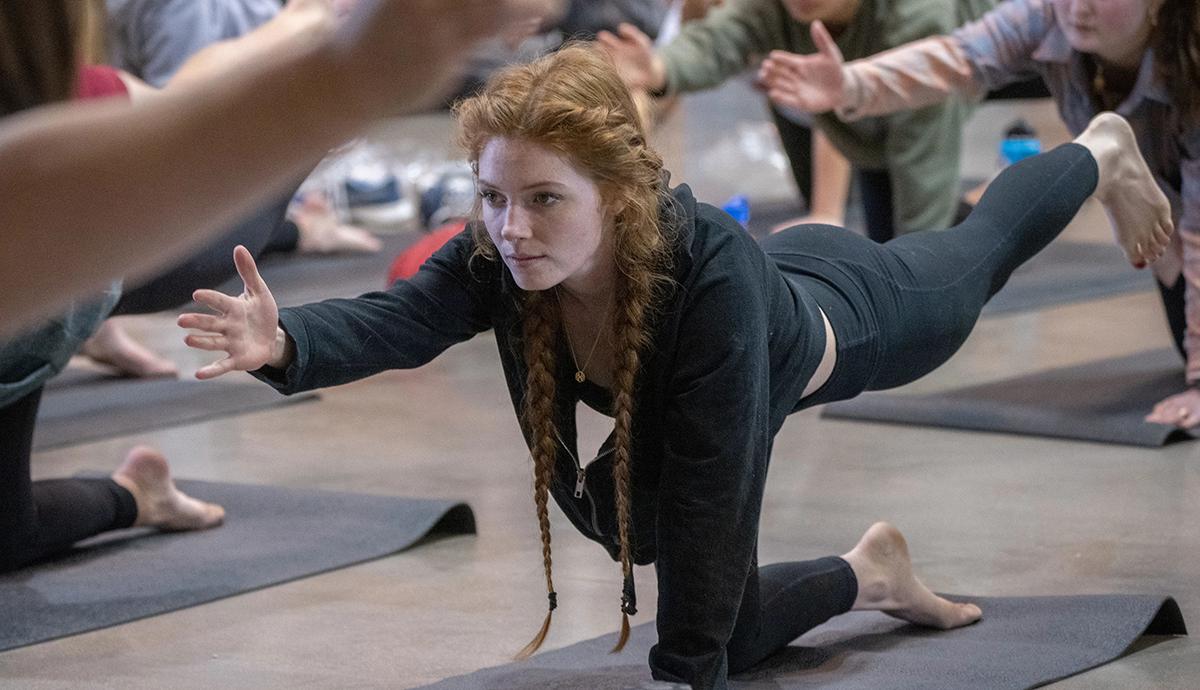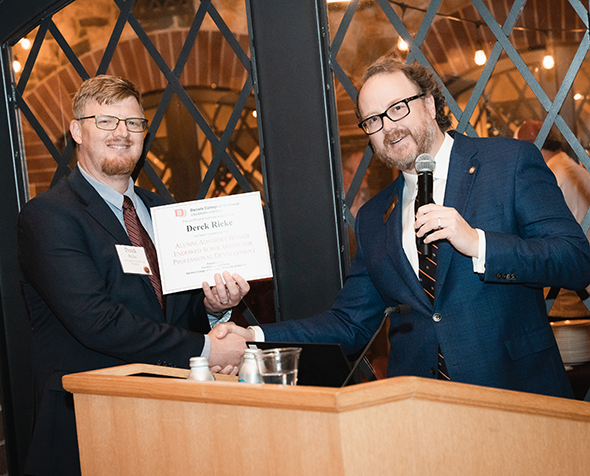4D Faculty Team Seeks to Support DU Community in Thriving

A DU student performs a yoga position at the Kennedy Mountain Campus. Well-being is one of the four pillars of the 4D Experience.
Many universities have programs that tout a holistic approach to education with a focus on student enrichment. But the University of Denver’s 4D Experience goes deeper in its mission to include faculty and staff in a multidimensional approach to advancing intellectual growth, promoting well-being, exploring character, and pursuing lives and careers of purpose.
That approach is evident in the 4D program’s newest initiative, the 4D Faculty Fellow Program, which Erin Willer, faculty innovation director, calls an effort to promote a thriving community.
Willer says that, yes, 4D is about providing students a well-rounded education to enable them to live meaningful and engaged lives.
“But it also means engaging faculty and staff in the same way,” she says. “So how can we collectively create an ecosystem where we are all swimming in that [4D] water that then creates opportunities for students and for faculty and staff to thrive—both while we’re here at work and at school, and then also in our everyday lives and beyond graduation for the students.”
Willer oversees the work of a three-person team of 4D Faculty Fellows, each of whom takes on one of the more holistic dimensions in their work. Psychology professor Kateri McRae is the well-being fellow, while writing professor Kara Taczak takes on reflection, and communication studies professor Cris Tietsort is the 4D faculty fellow of character.
Each faculty fellow heads up a community of practice or learning community to do work that corresponds with their individual focus.
Tietsort’s community of practice is the new DU Compassion Lab, which will serve to cultivate compassion among the DU community through research, creative work, teaching, service and community partnerships.
Tietsort says he hopes that the lab, which will begin in the spring quarter, will help bring faculty together and create a home for research on and study of compassion.
“We’re hoping that that the compassion lab, that is kind of co-created with other faculty, can be a place that the University continues to not just do research [in], but really [enables us] to think about how we integrate something like compassion as a core aspect of character within the broader university for years to come,” he says.
By this summer, he says, he wants to be able to look back on the lab as a success.
“First and foremost, I want people to leave and say, ‘I'm not just proud of what we accomplished, but that it was a fun, meaningful, caring community to be a part of,’” he says. “Secondly, I do want people to say, ‘We created something specific, that we know can be launched, that is tangible, and that excites and inspires us.’”
While compassion is the specific focus of the lab, Tietsort’s work with the faculty innovation team also covers character development. He says he believes the 4D Experience enables students to help guide their own journeys through the four dimensions.
“That’s the hope, that there is a sense of empowerment, there is a sense that students are crafting that experience,” Tietsort says. “Because every student can have a unique experience; every student has intersecting identities and values and different life stories and different commitments. There’s no one way that we can just say it needs to be all of ‘this.’ But with 4D, we’re trying to say, ‘Here’s four different arenas that we think are valuable—and also research-backed.’”
McRae says she hopes to demonstrate to faculty how they are already teaching well-being through her community of practice. This could mean professors creating curriculum about or relating to well-being or designing their classes with the well-being of students in mind.
“The group will be sharing what they're already doing, engaging in actual exercises that might increase well-being, and hopefully working on the start of a collection of resources that other faculty can use if they want to teach about well-being, or teach to enhance the well-being of their students,” she says.
Taczak’s 4D Reflection Learning Community, meanwhile, will invite faculty to learn about a holistic approach to incorporating reflection in their own courses and programs.
“Originally, reflection has always been thought of as, ‘Let’s look backwards; we're looking back over an experience or an understanding of something, so that we can move forward,’ and of course, that is part of my model, and I truly believe that is important,” Taczak says. “But the other side of it is looking inward to think about your current understanding of a situation or experience, or even your attitude, and then take that inwardness and project it outward.”
She says she hopes to develop more workshops for teaching faculty how to seamlessly integrate reflection into their work, so that students can learn how to reflect on their academic work and on their post-graduate lives.
“I always think about, ‘Why did I become an educator?’” Taczak says. “One of my goals was that I want to give students something meaningful that they literally can take forward with them.”










